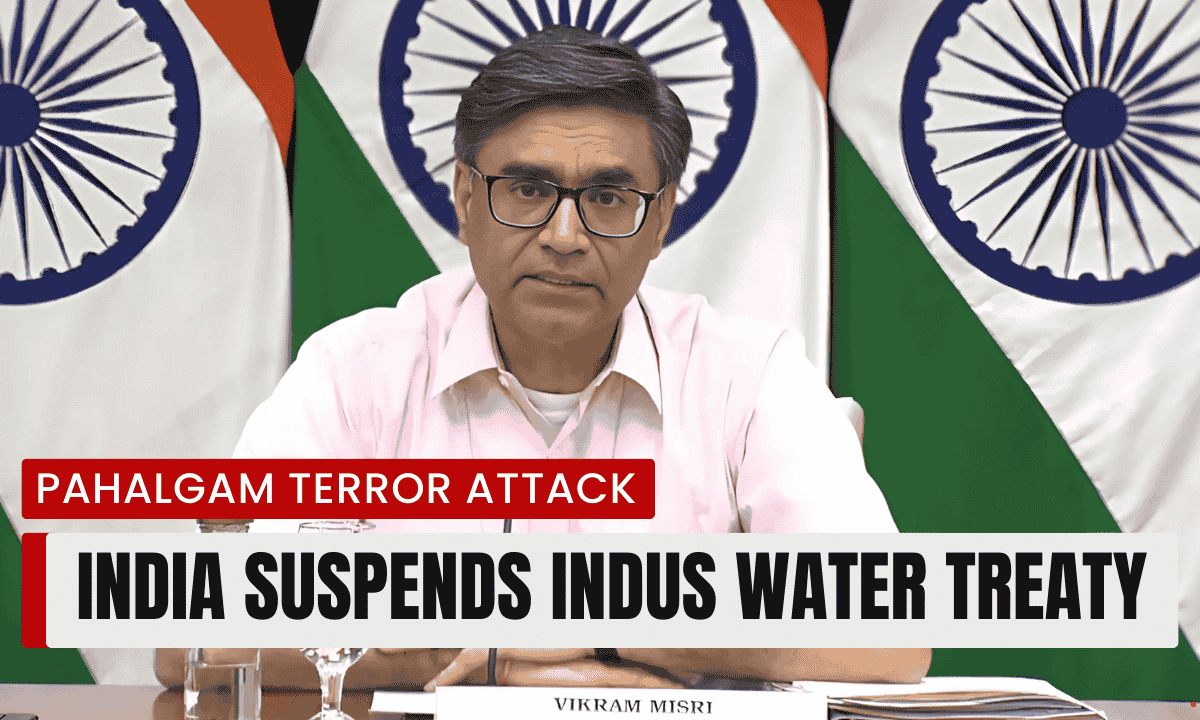India Suspends Indus Water Treaty, Orders Pakistan Nationals to Exit Within 48 Hours After Pahalgam Terror Attack – MEA
India suspends the 1960 Indus Water Treaty and mandates Pakistan nationals to leave within 48 hours following the deadly Pahalgam terror attack. Read the latest updates and key decisions by MEA.

New Delhi: In a decisive response to Tuesday’s deadly terror attack in Pahalgam, Jammu and Kashmir, which claimed 28 lives (including 25 Indian tourists and one Nepali citizen), India’s Cabinet Committee on Security (CCS) announced sweeping measures. The Ministry of External Affairs (MEA) declared the Indus Water Treaty of 1960 “held in abeyance” and ordered all Pakistan nationals to leave India within 48 hours
Also Read: Hyderabad IB Officer Among Tourists Killed in Terror Attack in Jammu & Kashmir
Table of Contents
Pahalgam Terror Attack Prompts India’s Historic Decision to Suspend Indus Water Treaty
Key Measures Announced by CCS
Following an emergency meeting chaired by Prime Minister Narendra Modi, Foreign Secretary Vikram Misri outlined five critical steps to counter cross-border terrorism:
- Indus Water Treaty Suspended: The 1960 pact governing river water sharing will remain frozen until Pakistan “credibly and irrevocably” ceases support for cross-border terror.
- Attari Border Closure: The Integrated Check Post at Attari is shut immediately. Pakistanis with valid visas must exit via this route by 1 May 2025.
- SAARC Visa Cancellation: All visas issued under the SAARC Visa Exemption Scheme to Pakistani nationals stand revoked. Those in India have 48 hours to depart.
- Expulsion of Defence Advisors: Pakistan’s military, naval, and air advisors in New Delhi are declared Persona Non Grata and given a week to leave. India will reciprocate by withdrawing its advisors from Islamabad.
- Embassy Staff Reduction: Both nations’ High Commissions will downsize from 55 to 30 staff by 1 May 2025.
Also Read: Muslim Youth Syed Adil Shah Shot Dead in Pahalgam Attack
“Zero Tolerance for Terrorism”: India’s Firm Stand
Foreign Secretary Misri emphasized that the attack, which targeted tourists in Pahalgam, aimed to destabilize Jammu and Kashmir’s post-election progress. “India will be unrelenting in pursuing perpetrators and their sponsors,” he stated, referencing the recent extradition of terror conspirator Tahawwur Rana.
Global leaders, including the US, UK, and EU, condemned the attack, backing India’s stance against terrorism.
What Does the Indus Water Treaty Suspension Mean?
The Indus Water Treaty, brokered by the World Bank, allocates control of six rivers between India and Pakistan. By halting the pact, India asserts pressure on Pakistan’s water resources, linking its revival to Islamabad’s “irreversible” action against terror groups.
Travel and Diplomatic Restrictions Explained
- 48-Hour Exit Order: Pakistani nationals in India on SVES visas face immediate expulsion.
- Attari Border: A critical trade and travel hub, its closure disrupts movement until further notice.
- Diplomatic Fallout: Expelling defence advisors marks a sharp escalation, reducing bilateral diplomatic engagement.
Security on High Alert
The CCS directed security forces to maintain “high vigil” across India. Jammu and Kashmir’s Lieutenant Governor pledged enhanced safety for tourists and residents, stating, “Such attacks will not derail peace or development.”
Global Reactions and Next Steps
While Pakistan has yet to respond, analysts view India’s measures as its strongest retaliation since the 2019 Pulwama attack. The MEA reaffirmed its commitment to global anti-terror partnerships, urging nations to isolate Pakistan diplomatically.
The Pahalgam terror attack has reshaped India’s security playbook, with the Indus Water Treaty suspension and expulsion of Pakistan nationals signaling unprecedented resolve. As the 48-hour deadline approaches, all eyes remain on Islamabad’s response and New Delhi’s next moves.
